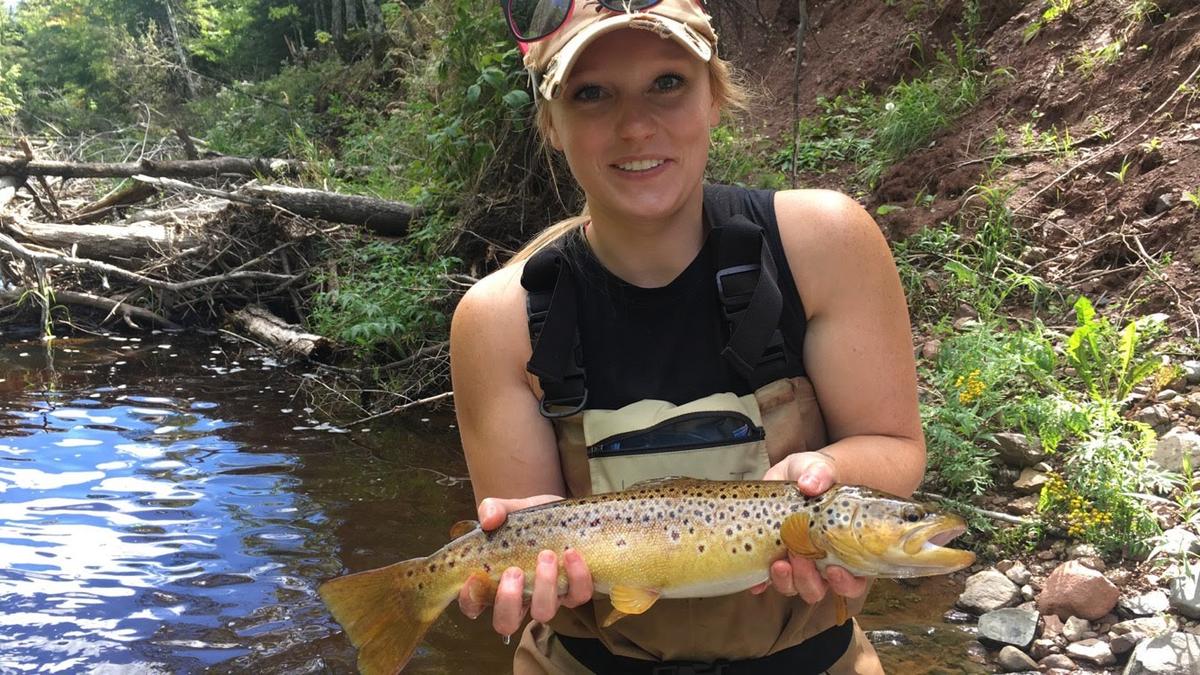It’s been a big year for Research Technician Kari Pierce – got married, bought a house and added another nephew to her auntie role. But between all that, her work at NRRI has kept her excited about projects that protect and improve water quality throughout the state and Great Lakes. Especially when she gets to put on waders and go out gathering samples in streams and wetlands.
“The outdoor world has always been a large part of my life and has always fascinated me,” said Pierce. “I grew up fishing and around lakes – my sister and I used to play with leeches and keep them as pets! – but when I started working at NRRI, I realized how interesting aquatic ecology is, and how creative the aquatic world is at adapting.”
One current project that gets her outdoors often is a study of stream restoration efforts in the Duluth area. The project documents the stream ecosystem response to restoration efforts to inform biologists and engineers on restoration best practices and how to be more effective in future efforts.
She’s also involved in a project to study ways to improve boat launch boat cleaning practices using a borrowed CD3 boat cleaning station set up in the NRRI parking lot.
“This ‘field work’ doesn’t get me out to beautiful locations and it requires a lot of repetitive tests and sample collection,” she said. “But what we learn will be pretty cool and very helpful in preventing aquatic invasive species from spreading throughout Minnesota.”
Student to Field Tech
While studying biology for her undergraduate degree at UMD, Pierce worked odd jobs – a bartender, an optician and an Information Specialist in Alaska’s Denali National Park. But her first real job after graduating in 2012 was as a Field Technician at NRRI working on the Coastal Wetland Monitoring Project, which still takes up most of her time.
Through the years, Pierce’s role for this project expanded to crew leader – hiring summer field techs, prepping gear, sample site planning, and leading week-long sampling trips – while training the new summer techs each year.
Cross-disciplinary Research
Pierce and her colleagues in the Lake, Stream & Wetland Ecology Group pull expertise from across the Institute and the University – fluvial geomorphologists, ornithologists and environmental engineers.
“There are also many opportunities to work with more groups throughout NRRI, especially related to mining, that I’m really excited about,” said Pierce.
Central Support
As a Field Crew Leader, Pierce spends a fair amount of time reserving NRRI fleet trucks, field GPS units, and field phones. She credits NRRI’s front desk team, Jenna Ballard and Lisa Paczynski, with getting her and her crew out the door and on their way.
“And when there are no available trucks they will find a way to get me what I need. How do they do it? They’re magicians,” she said. “I also appreciate their reminders to return things because sometimes we just forget.”
Off Hours
Now that the busy year is behind her – interrupted by a “best vacation ever” to Turks and Caicos – Pierce is enjoying hikes with her husband and their 4-year-old springer spaniel, Loki.
“It’s especially fun now that the fall colors are out and so beautiful!” she added.
